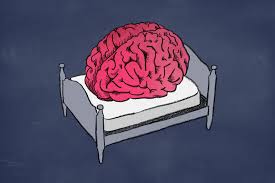The Impact of Sleep Onset Insomnia on Your Health
Sleep onset insomnia, also known as initial insomnia, is a common sleep disorder characterized by difficulty falling asleep at the beginning of the night. This condition can have a significant impact on your overall health and well-being.
Individuals with sleep onset insomnia often experience prolonged periods of lying awake in bed before finally falling asleep. This can lead to feelings of frustration, anxiety, and fatigue during the day. The lack of quality sleep can affect your mood, cognitive function, and physical health.
Research has shown that chronic sleep onset insomnia is associated with an increased risk of developing other health conditions, such as depression, anxiety disorders, obesity, diabetes, and cardiovascular diseases. The constant struggle to fall asleep can disrupt your body’s natural sleep-wake cycle and contribute to a range of negative consequences.
Fortunately, there are strategies that can help manage sleep onset insomnia and improve your sleep quality. Establishing a consistent bedtime routine, creating a relaxing sleep environment, avoiding stimulants like caffeine close to bedtime, and practicing relaxation techniques such as deep breathing or meditation can all contribute to better sleep onset.
If you are experiencing persistent difficulties falling asleep at night, it is important to consult with a healthcare professional or a sleep specialist. They can provide further evaluation and recommend appropriate treatment options tailored to your specific needs.
Remember that addressing sleep onset insomnia is crucial for maintaining your overall health and quality of life. By taking proactive steps to improve your sleep habits and seeking professional help when needed, you can effectively manage this condition and enjoy restful nights of rejuvenating sleep.
Understanding and Managing Sleep Onset Insomnia: Causes, Duration, and Solutions
- What causes sudden onset insomnia?
- How long does sleep onset insomnia last?
- How do you fix sleep onset insomnia?
- How to get rid of sudden insomnia?
- How to fix sleep onset insomnia?
What causes sudden onset insomnia?
Sudden onset insomnia, also known as acute insomnia, can be triggered by various factors such as stress, anxiety, changes in routine, environmental disruptions, or underlying medical conditions. The sudden onset of insomnia may be a response to a specific event or situation that disrupts your usual sleep patterns and makes it difficult to fall asleep. Emotional distress, jet lag, illness, or even excessive consumption of caffeine or alcohol can contribute to the development of acute insomnia. It is important to identify and address the underlying cause of sudden onset insomnia to effectively manage and improve your sleep quality. Consulting with a healthcare provider or sleep specialist can help determine the appropriate treatment and strategies to address this temporary disruption in your sleep.
How long does sleep onset insomnia last?
Sleep onset insomnia can vary in duration from person to person. For some individuals, it may be a temporary issue caused by specific circumstances or stressors, lasting only a few nights or weeks. However, for others, sleep onset insomnia can become a chronic condition that persists for months or even longer if left untreated. Factors such as underlying health conditions, lifestyle habits, and psychological factors can influence the duration of sleep onset insomnia. Seeking professional guidance and implementing effective sleep hygiene practices are essential steps in managing and potentially reducing the duration of this sleep disorder.
How do you fix sleep onset insomnia?
To address sleep onset insomnia, it is essential to establish a consistent bedtime routine that signals to your body it is time to wind down and prepare for sleep. Creating a relaxing sleep environment, free from distractions and electronic devices, can also help promote better sleep onset. Avoiding stimulants like caffeine close to bedtime and practicing relaxation techniques such as deep breathing or meditation can further support the transition to sleep. Additionally, consulting with a healthcare professional or a sleep specialist for personalized guidance and treatment options tailored to your specific needs is recommended for effectively managing sleep onset insomnia.
How to get rid of sudden insomnia?
Sudden insomnia, also known as acute or transient insomnia, can be a disruptive experience that leaves individuals feeling frustrated and exhausted. To address sudden insomnia effectively, it is important to first identify and address any potential triggers or underlying causes. Practicing good sleep hygiene, such as maintaining a consistent sleep schedule, creating a relaxing bedtime routine, and ensuring a comfortable sleep environment, can help promote better sleep. Additionally, incorporating stress-reducing activities like meditation or deep breathing exercises before bedtime can calm the mind and prepare the body for rest. If sudden insomnia persists or significantly impacts daily functioning, seeking guidance from a healthcare professional or sleep specialist is recommended to explore further treatment options tailored to individual needs.
How to fix sleep onset insomnia?
Addressing sleep onset insomnia requires a comprehensive approach that focuses on establishing healthy sleep habits and creating a conducive sleep environment. To fix sleep onset insomnia, it is essential to maintain a consistent bedtime routine, including winding down before bed with relaxing activities like reading or taking a warm bath. Avoiding stimulants like caffeine close to bedtime and limiting screen time on electronic devices can also help signal to your body that it’s time to sleep. Creating a comfortable and dark sleeping environment, practicing relaxation techniques such as deep breathing or meditation, and seeking professional guidance if needed are all important steps in managing and improving sleep onset insomnia.



